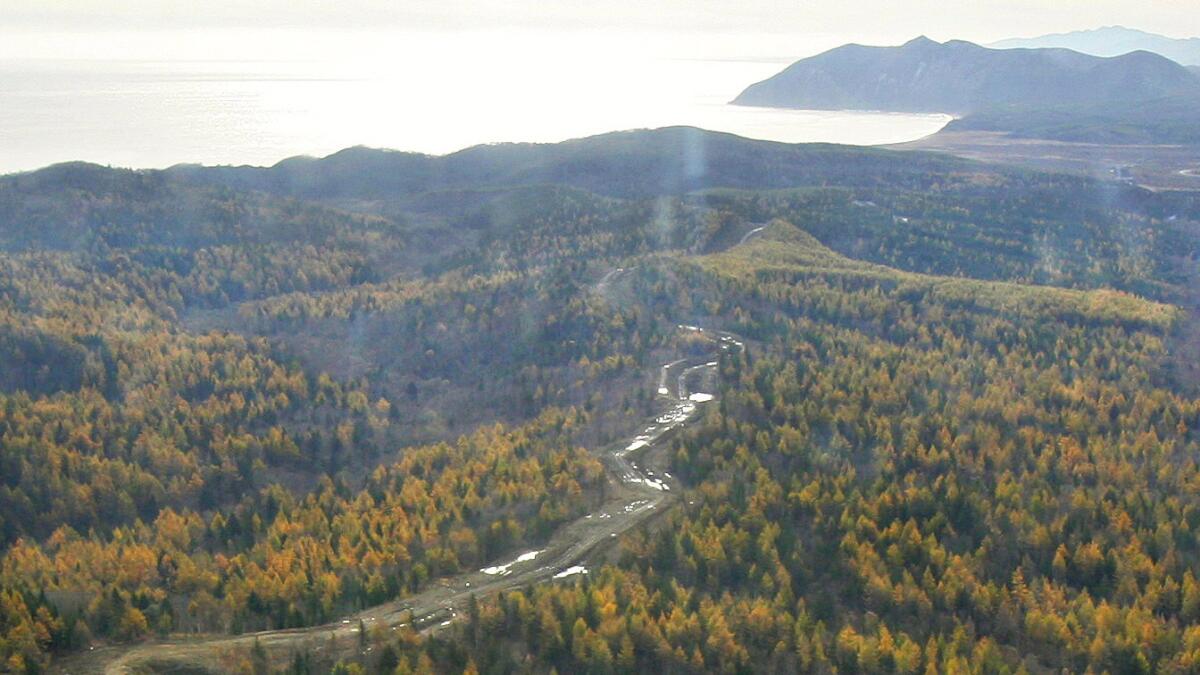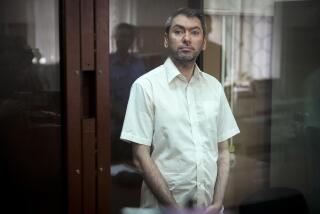Activist organizations struggling to survive under Russian restrictions

An aerial view of the Sakhalin 2 oil pipeline on the Pacific island of Sakhalin in 2006.
- Share via
Reporting from MOSCOW — After decades of Soviet-era drilling, unregulated fisheries and haphazard construction, residents of Russia’s Sakhalin Island have cheered the ecological protections secured by Sakhalin Environment Watch over the last 20 years.
One of the most effective civil society movements to emerge in the post-communist era, SEW led the ravaged island’s campaign for protection of the pristine, 165,000-acre Vostochny Reserve, said to be the most productive salmon ecosystem on the planet.
The group fought successfully in court to have higher standards imposed on the powerful Gazprom monopoly for its fossil fuel exploration. It also took legal action to force an international consortium of oil giants behind the $12-billion Sakhalin I and II extraction projects to steer clear of sensitive marine life habitat and to scrap planned pipelines across gray whales’ migration route.
See the most-read stories this hour >>
But activist organizations now face government threats to their own survival for having accepted foreign grants and donations for their ecological causes. They have been ordered to register as “foreign agents” because of internationally supported conservation work recently condemned by the Justice Ministry as Western schemes to undermine the Russian government.
A $159,000 contribution from the Leonardo DiCaprio Foundation, $30,000 from the U.S.-based Wild Salmon Center and other gifts for the island’s environmental campaigns are being returned as SEW attempts to sever ties with foreign partners that the Kremlin brands as Russia’s foes.
More than 90 nongovernmental organizations in Russia have been listed as Western collaborators under a 2012 law requiring groups receiving funding from abroad and engaging in undefined political activity to register as “foreign agents.” That label from the Stalinist era still prompts fear among Russians being told by President Vladimir Putin that foreign forces are bent on denigrating the country.
The nationalist-dominated parliament this year tightened the noose on the foreign partners of nongovernmental organizations by empowering justice officials as of last month to brand them “undesirables,” forcing them out of the country.
The Open Society Foundations of philanthropist George Soros, the U.S. National Endowment for Democracy, the MacArthur Foundation and other civil society bulwarks have been forced to close their Russian operations after being accused of engaging in prohibited political behavior.
“On one hand this is very serious but on the other it is completely absurd – Kafkaesque!” said Alexander Cherkasov, executive director of Memorial Human Rights Center in Moscow.
Memorial was fined $5,000 for failing to register under the 2012 law and for civil rights activities by an international counterpart that is a separate NGO, Cherkasov said. Memorial International went to court on the human rights group’s behalf, explaining that the cited infractions were their own, though defending them as rightful free expression. The appeals court nonetheless upheld the foreign agent label on Cherkasov’s organization and doubled the fine to $10,000.
“I’m trying to deal with cases of people being ‘disappeared’ and victims of harassment and injustice, yet I have to spend all my time fighting these absurd accusations,” Cherkasov said. “We survive. It’s not like Stalin times; no one is being executed by firing squad. But that may be the only difference.”
The crackdown has focused not only on the groups whose support for democracy and pluralism put them at odds with the Kremlin but against NGOs engaged in government-endorsed programs as well.
The Civic Assistance Committee provides relief for those displaced by disaster or armed conflicts, including the one in eastern Ukraine that has sent hundreds of thousands of refugees to Russia. The Russian NGO periodically receives contributions from the Office of the U.N. High Commissioner for Refugees.
The committee also receives money from the Russian government to care for displaced Russians, resulting, said chairwoman Svetlana Gannushkina, in the government punishing her agency for the same behavior that it helps finance.
“I think they want to control every benefit that goes out to any Russian, so that everyone is dependent on them,” she said of the Kremlin. “But this is destroying civil society. We are seeing the disintegration of all institutions. There is no legal recourse and no arena where real political debate can be held.”
The Sakhalin environmentalists’ new status as suspected agents-provocateurs appears to be the result of the May legislation’s definition of any attempt “to influence government authorities” as doing so at the direction of foreign paymasters.
A SEW post on Russian social media appealing for restraint in Arctic development drew the attention of the regional Justice Ministry in August. A surprise two-week inspection of SEW premises in Yuzhno-Sakhalinsk produced the report citing alleged political activities behind the foreign agent label.
The first of three alleged violations cited SEW’s criticism of the Kremlin’s ambitious plan to build new bases, ports, fuel depots and floating ice stations in the Arctic to secure the emerging Northern Sea Route.
As Arctic ice melts with the warming global climate, a previously frozen passage is now navigable about half the year. Russia has made control of the new shipping lanes a priority, seeking United Nations recognition of the undersea territory as its exclusive national zone and budgeting tens of billions of dollars for nuclear-powered ships to patrol and service the route.
Canada, Denmark, the United States and other countries bordering the Arctic Circle are also vying for a piece of the potentially lucrative shipping route.
SEW Director Dmitry Lisitsyn has vowed to fight the registration order in court.
“SEW has protected the environment of Sakhalin and its citizens’ environmental rights for 20 years,” he told journalists in a statement last month from his office seven time zones east of Moscow. “We have much to be proud of. We have never engaged in politics.”
None of the 20 or so NGOs waging legal battles against their orders to register as foreign agents or disband after being immobilized with the “undesirable” label have prevailed in court.
If the Justice Ministry’s decision isn’t repealed, Lisitsyn said, his group will consider shutting down.
More to Read
Sign up for Essential California
The most important California stories and recommendations in your inbox every morning.
You may occasionally receive promotional content from the Los Angeles Times.













